DB Schenker & Mpreis put Hyzon H2 Trucks on the road in Europe
Mpreis and DB Schenker are now using the first hydrogen-powered semi-trailer trucks from Hyzon Motors in Austria and Germany. Mpreis has received the first of 70 commercial vehicles ordered directly from Hyzon Motors, while DB Schenker is leasing an Hyzon H2 semitrailer tractor from Hylane.
***
Both customers have opted for the Hyzon Hymax 250 – a semitrailer tractor that can reach 40 tonnes as a vehicle combination. Mpreis and DB Schenker speak of a premiere in their respective countries: In this weight class, the hydrogen semi-trailer truck is a novelty in Austria, says the local Austrian grocery retailer. Just next door, in the neighbouring country of Germany, “We are using the first hydrogen semitrailer tractor approved for regular operation,” DB Schenker concurs. While H2 trucks such as Hyundai’s Xcient are already on the road, the Hyzon Hymax 250 is still largely unrivalled as a heavyweight semi-trailer truck with its fuel cell drive.
In terms of classification, Hyzon Motors assembles hydrogen fuel cell commercial vehicles in the USA and Europe. The US company was able to expand very quickly after its founding in March 2020 because it was able to draw on technology from Horizon Fuel Cell Technologies – a hydrogen fuel cell company founded in Singapore about 18 years ago. In Europe, the company’s start was bumpy. Hyzon initially brought Holthausen Clean Technology on board for its European headquarters, which opened in Groning, the Netherlands, in July 2020. Two and a half years later, Hyzon took full control of its European business in December 2022. The move was foreshadowed as Hyzon was increasingly dissatisfied with its joint venture partner.
Hyzon is not an OEM in the classic sense, but the company uses existing vehicles as a basis for its developed FC drive. In the Netherlands, Hyzon trucks are based on DAF’s XF Space Cab tractor. In Germany, Hyzon made news not so long ago with the takeover of the German conversion specialist Orten, announced in June 2022, which, however, was cancelled again in October 2022 before it was completed.
In Austria, the grocery retailer Mpreis placed an order with Hyzon in 2021 for up to 70 fuel cell-powered heavy-duty trucks. Delivery was supposed to start in May 2022, but due to supply bottlenecks of individual components, the handover was delayed. Now Mpreis has confirmed the arrival of the first example from Hyzon’s assembly in the Netherlands. Over the next few years, the entire Mpreis fleet will gradually be converted to fuel cell trucks.
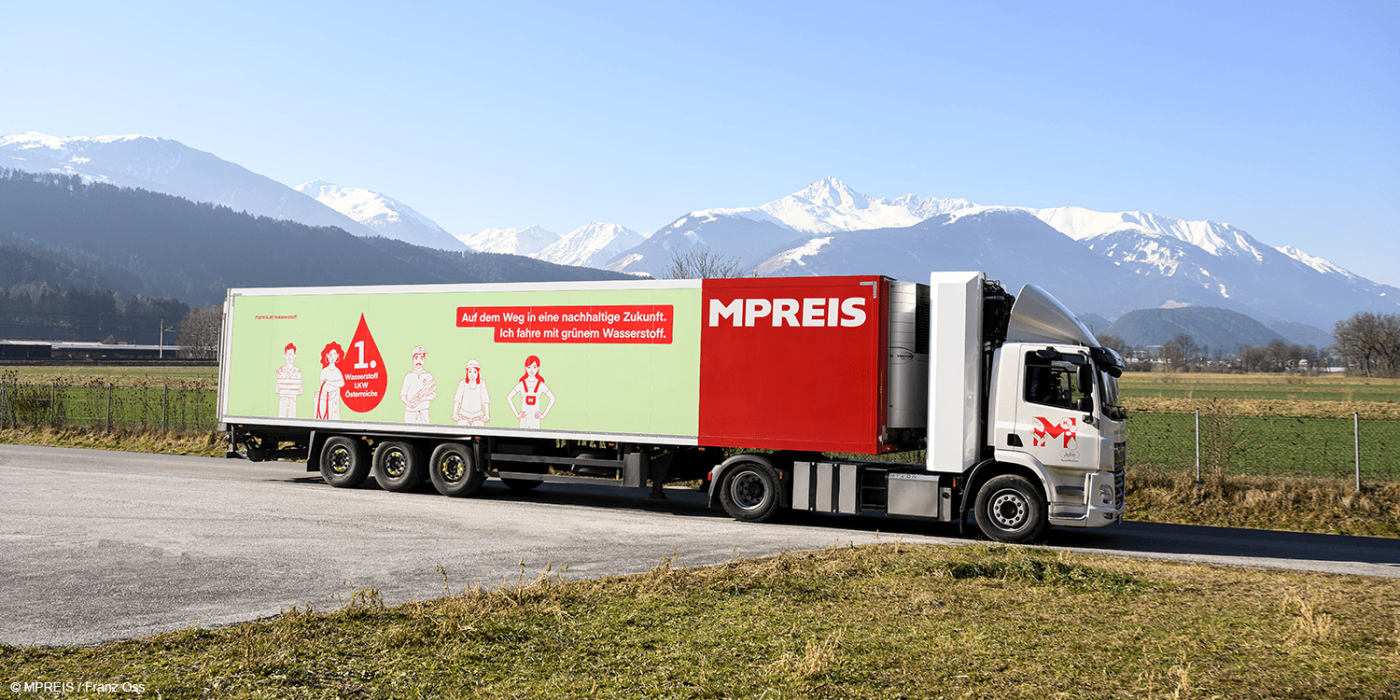
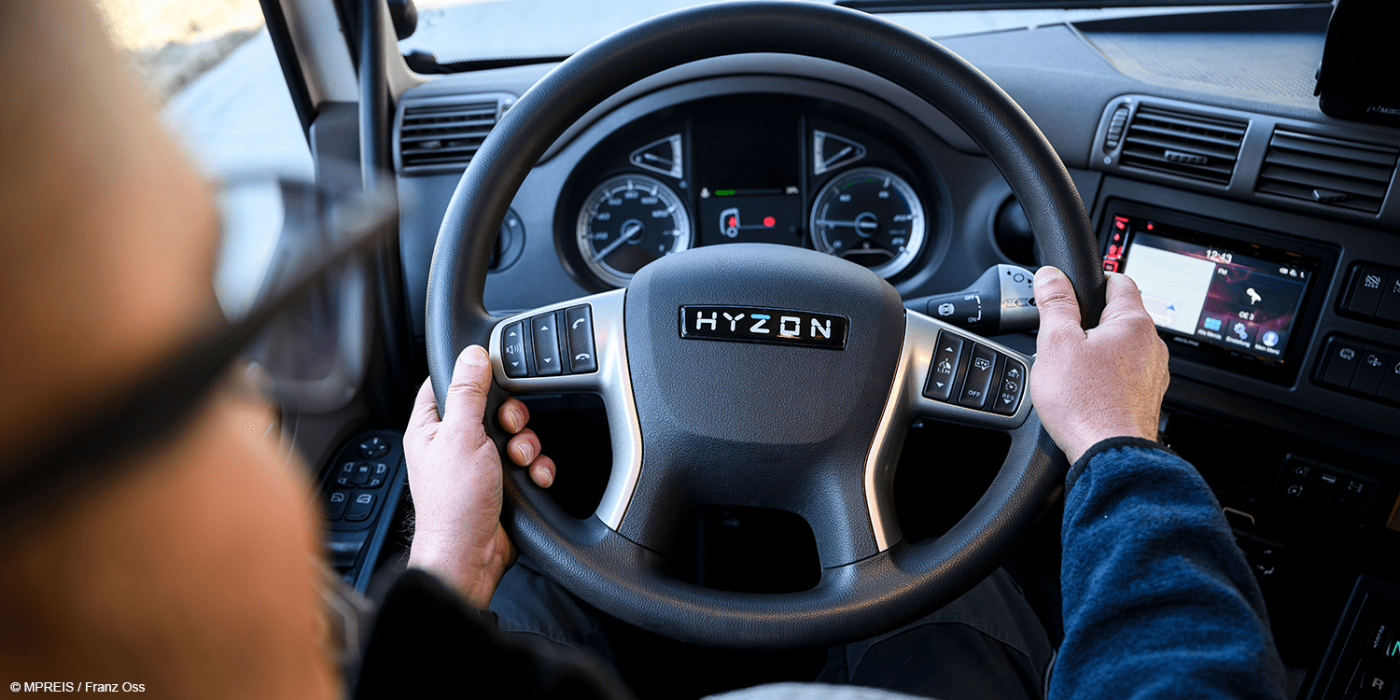
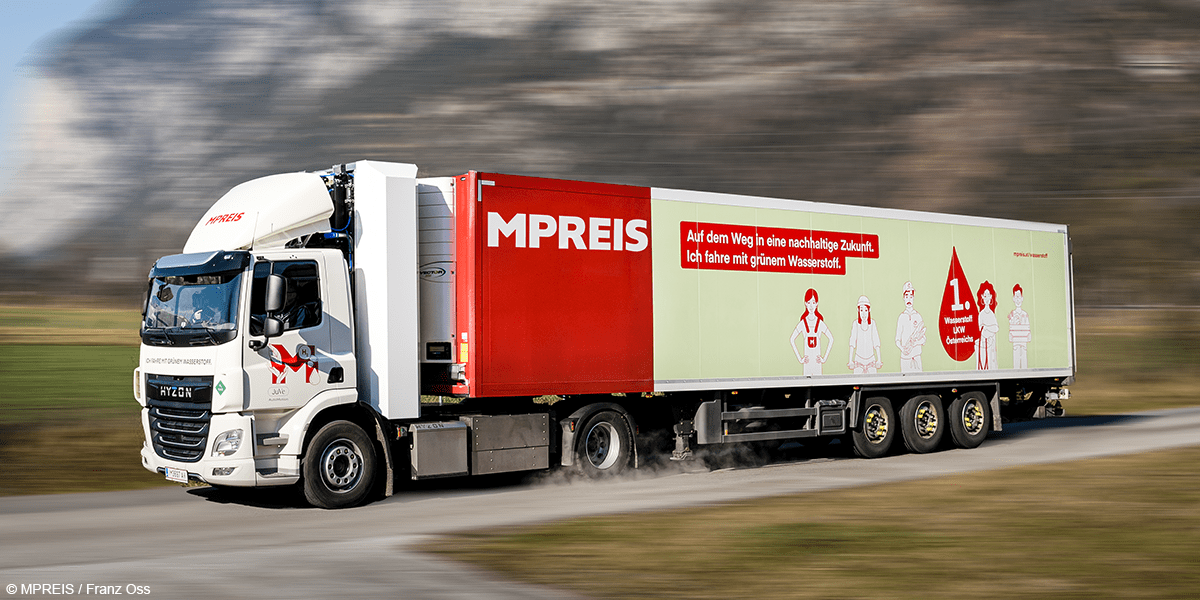
The H2 truck is now in operation and delivers goods to Mpreis branches located near the Inntal motorway between the company’s headquarters in Völs near Innsbruck and Kufstein. Mpreis produces the green hydrogen used to power the model itself, for which the company has built its own electrolysis plant. The H2 truck is also refuelled at the company headquarters in Völs where Mpreis has built a hydrogen filling station, which is said to be the first truck filling station, including a trailer filling station in Austria and currently the most powerful hydrogen filling station in Europe.
Mpreis states that the vehicle of the type Hyzon Hymax 250 – according to the press pictures in the configuration 4×2 – has been adapted to its own needs but does not specify in what way. The local supplier will not operate the vehicle itself but has brought the Innsbruck-based FC specialist JuVe AutoMotion on board. In future, the start-up, which was only founded in 2021, wants to act as a central importer of Hyzon vehicles in Austria and cover the entire Austrian market as a service provider for fuel cell trucks.
The H2 semitrailer truck that has now been flown in by Mpreis houses a 120-kW fuel cell, a 250-kW peak-E engine, weighs 19 tonnes without a trailer and holds around 39 kilogrammes of hydrogen in its tank which can be filled up in about eleven minutes. The range is said to be about 450 kilometres, whereby the battery range is shown separately at about 60 kilometres. The medium-sized company from the Austria Tyrol region says that the hydrogen truck consumes about 10 kilogrammes per 100 kilometres.
“Our truck fleet, which currently still runs mostly on diesel, is a major greenhouse gas emitter with around 4,000 tonnes of CO2 emissions per year. An H2 truck reduces emissions by about 65 tonnes of CO2 per year compared to a conventional diesel truck,” describes Ewald Perwög, project initiator of Mpreis Wasserstoff. “With the gradual conversion of our entire truck fleet to H2 trucks, the ‘corporate carbon footprint’ can be greatly reduced, thus making our contribution to climate neutrality, which Austria aims to achieve by 2040 at the latest.”
Mpreis describes itself as a pioneer in the field of environmental protection and sustainability. For example, the family-owned company is one of the largest photovoltaic operators in Austria and, by its own account, was the first company in Europe to build a passive house supermarket, which, for those unfamiliar with the term, is a building designed for minimal energy consumption by making the most of available sunlight and warmth from other household sources. Now the grocer is focusing on green hydrogen “because we want to continue to decarbonise our company and be ‘part of the solution’ in terms of climate change,” says Managing Director Martina Dutzler.
Mpreis has been pursuing the idea of utilizing hydrogen for transport since 2016 under the division Mpreis Sustainable Energy Solutions. The construction of a single-stack electrolysis plant was started in March 2020. Two years later, the PAE electrolyser went into operation. In June 2022, the medium-sized company opened a hydrogen filling station for trucks at its headquarters in Völs. At the facility developed by Linde Engineering, up to 40 kilogrammes of hydrogen can be filled into the vehicles in ten minutes at the standard 350 bar for commercial vehicles. Within one day, up to 40 trucks should be able to fill up at the pump.
The hydrogen initiative of the local supplier is interwoven with the HyWest research centre at the Green Energy Center Europe in Innsbruck: “The first H2 truck is the final logistics building block for the hydrogen business case and a functioning local green hydrogen economy at Mpreis,” says Nikolaus Fleischhacker, head of the HyWest research centre. “On a regional level, with HyWest and other research competition projects (…) we connect the Mpreis project with the H2 region Zillertal, where in the future heavy-duty mobility applications such as trains, buses, and snowcats will be powered by green hydrogen, and with TIWAG’s H2 project at the Inn power plant Kufstein/Langkampfen, where a multifunctional hydrogen centre will cover the demand for green hydrogen in the Brenner corridor.”
For now, as mentioned, the Hyzon semi-trailer truck will deliver to Mpreis shops located near the Inntal motorway between the company’s headquarters in Völs near Innsbruck and Kufstein. Hydrogen-powered Solo trucks, which will later complement the fleet, will drive to the branches in Tyrol’s valleys. “We are incredibly proud to be able to officially commission Austria’s first hydrogen-powered fuel cell truck,” says Managing Director Martina Dutzler. Mpreis regularly receives visits from international stakeholders to learn about the implementation of the concept, she added.
Across the border in Germany, another Hyzon Hymax 250 is on the road with DB Schenker using the articulated lorry as a 40-tonne vehicle combination in daily transport between its Cologne office and Eupen in Belgium. Under the DB Schenker brand, the German national rail group, Deutsche Bahn AG, manages the business unit for all of its transport and logistics services (with the exception of rail freight transport, which is organised in the DB Cargo business unit).
According to the press photos, like the Austrian grocery retailer, the German logistics company is using a 4×2 arrangement, whereby Hyzon also markets a 6×2 variant of the Hymax 250. Unlike Mpreis, however, DB Schenker has not bought the H2 truck but leased it from the company Hylane. The cooperation will last for a longer period since DB Schenker intends to gradually build up a fleet of fuel cell vehicles with the leasing company. Hyzon Motors will deliver 18 fuel cell trucks to Hylane.
DB Schenker puts the range of the Hyzon truck at around 400 kilometres, while at the same time, the maximum payload is higher than with purely electric trucks. The logistics group describes the rapid refuelling process of about 15 minutes as another major advantage of hydrogen technology in everyday use. The greater Cologne area should also be well suited for using the hydrogen tractor unit, “especially thanks to the well-developed refuelling infrastructure in this region”, says the German-based international logistics group.
“The deployment of the first hydrogen 40-tonners in cross-border transport between Germany and Belgium is a great success in the context of our long-term sustainability goals,” says Cyrille Bonjean, Executive Vice President Land Transport in Europe at DB Schenker. “It shows that we are operating at the cutting edge of technology. And it is a good example of the importance of cooperation with innovative and high-performance green mobility companies.” Further hydrogen tractor units are planned, he said.
DB Schenker is among the first to order, buy or lease several new zero-emission trucks. This applies, for example, to the Mercedes eActros, the MAN eTruck, the eTrailer from Trailer Dynamics or the Volta Zero from Volta Trucks, 150 of which are due to arrive at DB Schenker in the course of the year. A total of 1,500 units have been ordered from Volta Trucks, which are all battery-electric applications.
Hydrogen propulsion in long-distance transport is still uncharted territory for DB Schenker. The group is now using the Hyzon truck in a pay-per-use model from rental company Hylane, which belongs to DEVK and specialises in providing hydrogen solutions in the logistics sector. The cooperation between the two companies has been going now for over two years and, in addition to the rental agreement, also includes joint development projects. The driving and operating data of the regular service now starting on the Cologne – Eupen route will therefore also be used by Hylane to further improve its usage-based rental models for CO2-neutral mobility.
“Putting the first hydrogen tractor unit into operation with DB Schenker in Germany is an important success,” says Hylane Managing Director Sara Schiffer. “We have been working towards this for a long time. DB Schenker is playing a pioneering role by testing the vehicles. Together we are gaining important experience for a market ramp-up of hydrogen mobility in Germany.”
In mid-April 2022, it was announced that Hylane had ordered a total of 18 fuel cell trucks from Hyzon Motors. The DEVK subsidiary initially offers customers vehicles from four manufacturers – in addition to Hyzon, these are Hyundai, Daimler Truck and MAN Truck & Bus or a conversion solution of the company Framo eTrucks with fuel cell from Bosch GmbH. Hylane’s offer provides for a minimum rental period of 24 months.
Report by Cora Werwitzke, translated from German

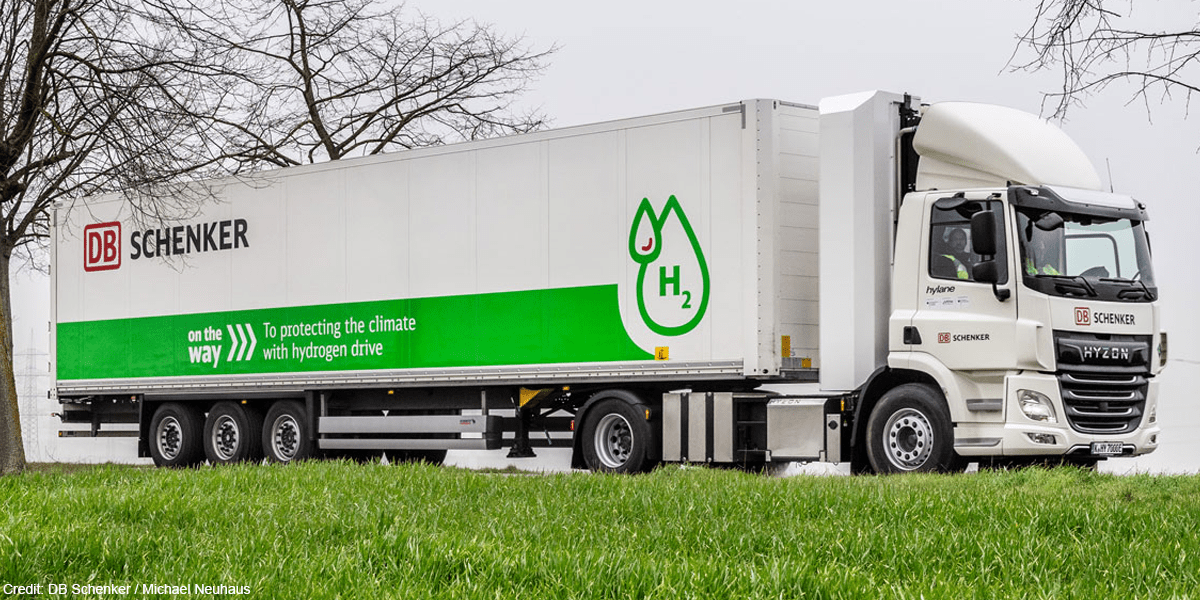
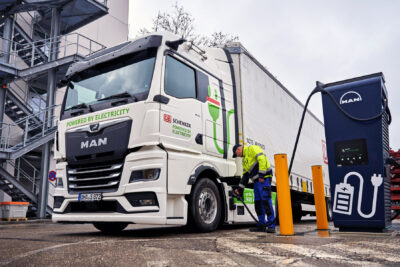
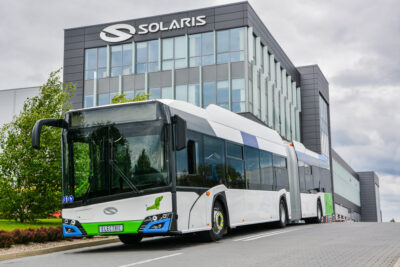
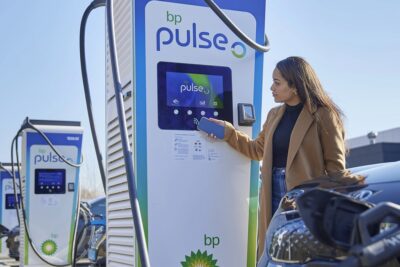
0 Comments